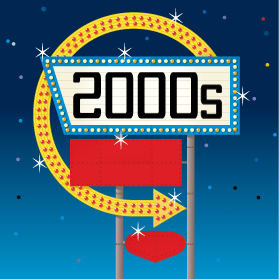2000: The bubble bursts
- The dotcom collapse, results in huge losses for droves of investors. Hundreds of companies close some never having turned a profit. The NASDAQ which peaks at over 5,000, loses 10% of its value in a single day, and finally hits bottom in October of 2002.
2001: A new kind of encyclopedia
- Wikipedia, which paves the way for collective web content generation/social media is launched.
2003: VoIP goes mainstream, MySpace & CAN-SPAM Act
- Skype is released to the public, giving a user-friendly interface to Voice over IP calling.
- MySpace becomes the most popular social network.
- CAN-SPAM Act puts a lid on unsolicited emails.
2004: Web 2.0 and Social Media
- The term "Web 2.0", referring to websites and Rich Internet Applications (RIA) that are highly interactive and user-driven becomes popular.
- The term "social media" referring to social media–sites and web applications that allow users to create and share content and to connect with one another–started around this period, is coined.
- Digg, a social news site, revolutionizes traditional means of generating and finding web content, by promoting news and web links which are reviewed and voted on by a community.
- Facebook is launched though at the time it was only open to college students and is called "The Facebook".
2005: YouTube – streaming video for the masses
- YouTube launches bringing free online video hosting and sharing to the masses.
2006: Twitter begins tweet
- Twitter is launched. The first Twitter message is "just setting up my twttr".
2007: Major move to place TV shows online & the iPhone
- Hulu a joint venture between ABC, NBC, and Fox is launched to make popular TV shows available to watch online.
- The iPhone and the Mobile Web revolutionzies the world. The biggest innovation of 2007 was almost certainly the iPhone, which was almost wholly responsible for renewed interest in mobile web applications and design.
2008: Internet Election
- The first "Internet election" takes place in 2008. For the first time, national candidates take full advantage of all the Internet has to offer. Virtually every candidate has a Facebook page or a Twitter feed, or both.

